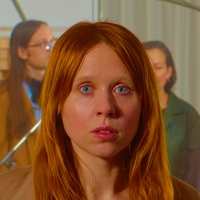On growing a cooperative like you’d grow a garden
Prelude
Dan Taeyoung researches and creates design tools, architectural spaces, and social collectives that change the way we think and collaborate with each other. They study how our environments and relations change the way we think, feel, and play together. Dan teaches at Columbia University GSAPP, is a founding member of Prime Produce, an intentional cooperative for social good, and Soft Surplus, a collective space for learning and making together.
Editor’s note: This interview is part of our series with staff and artists involved with Pioneer Works. Dan will be giving a talk at Pioneer Works’ Software for Artists Day on Saturday, June 15, 2019. The Creative Independent will also present a workshop at Software for Artists Day, inspired by our series with Are.na on using the internet mindfully.
Conversation
On growing a cooperative like you’d grow a garden
Architect, designer, teacher, and learner Dan Taeyoung discusses building trust within cooperative spaces, developing open-ended systems, and un-learning hierarchical ways of operating.
As told to Willa Köerner, 3347 words.
Tags: Architecture, Technology, Beginnings, Collaboration, Money, Process.
How’d you end up doing what you do now? Were there a few particular forks in the road that helped you define your practice?
Right now, my practice feels like a braid of three different things. There’s computational architecture and design, and thinking about—in a somewhat heavy, intellectual way—how different tools change how we design things, and teaching that. Then there is the community-organizing and space-building part of my work, which is really important to me. And then there’s this idea of activist real estate, which is an inquiry into, “What are the financial structures necessary to create space, and how do you shift them?”
Around the time I was in grad school, Occupy Wall Street became interesting to me. I got really into it, which was surprising. There was a kitchen where people were making food, and just handing it out to anyone who wanted to eat. I can’t really explain why, but it was really revelatory for me, like, “Wow, it doesn’t take that much to feed people. It doesn’t take that much to create social infrastructure.” It was a very clear example of everyone working together, in what I would call a joyous and convivial way, to make infrastructure and support each other. I’d never seen something like this before, where everyone was like, “I’m rolling cigarettes for people who want to smoke cigarettes. I’m making sandwiches for people who are hungry.” That was really impactful.
In grad school I was also reading and thinking more about financial inequality. And then I also went on a trip to Israel and Palestine, and did a lot of thinking about politics and power. I started questioning, “What are the financial structures of how architecture is supported? Who are buildings built for? Why are so many architectural practices so connected to luxury?” Space is so interesting, yet the architectural discipline is dominated by visual aesthetics, and not usually the other aspects of it.
And so most of my projects started leaning towards that. I remember in grad school, designing projects that leaned towards alternative-currency building systems, or into developing new economies through space.
What’s an “alternative-currency building system?”
For example, I had a project that was set in Japan, where there’s an alternative currency called “Fureai Kippu” ( ふれあい切符 in Japanese, or “Caring Relationship Tickets”). It’s for elderly folks to give young people tokens of gratitude for doing grocery work or helping out around the house. I designed a combination of a retirement home for the elderly, and a co-living space for early- to mid-20-year-olds. Because there are a lot of older people in Japan with a lot of disposable income, but not a lot of social connections, and then the exact inverse for younger people. So within the space, there would be an ecosystem that ultimately had a social effect.
These are the kinds of projects I got really into. Then towards the end of grad school, a friend approached me for help finding an architect for the nonprofit he was running, called Prime Produce. I thought about it for a day and I was like, “Actually, I will give you my own pitch in two weeks. If you don’t like it, then I’ll help you find someone else really great.” After that, I got together with two other friends and we started working on the building. Two weeks later we pitched to him and his board of directors. After months of talking about it, they agreed, so we started working on this real building project right at the end of school.
As we started to design it, I was having so many interesting conversations with [Prime Produce’s founding members] Jerone Hsu and Chris Chavez about how the space would inform the social interactions, like, “What would happen if the second floor was all shoes-off? What kind of space do you need to make decisions within?” And so the spatial and social were really mixed within our discussions.
At some point, Jerone and Chris were like, “Maybe you should just join our group?” So I decided I should put my money where my mouth is, so to speak. I became part of Prime Produce because I thought working within such a group would enable me to explore this social extension of what architecture can and should be.
Can you describe what Prime Produce is?
Prime Produce is an intentional community of people, all of whom are trying to serve other people through their work. We have members working on racial justice nonprofits, mindfulness meditation, advocacy for community gardens, and so many other things. There are also some artists in the space. It’s kind of like a commune, but for work. It’s a cooperatively run group, so everyone is a member of the cooperative and all the decisions are made together.
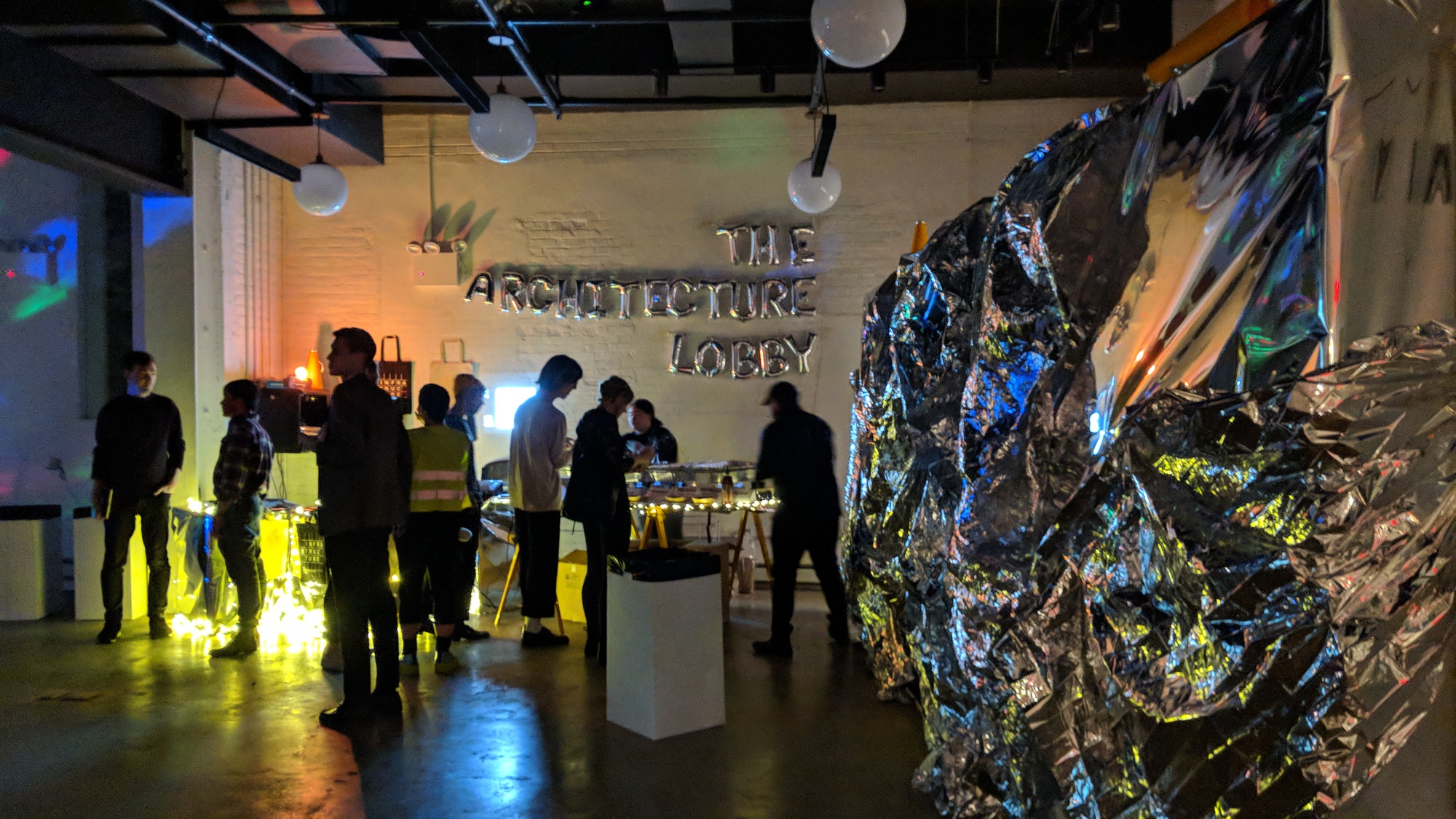
Photo from Architecture and Labor fundraiser by The Architecture Lobby, hosted at Prime Produce
What does it take to be a cooperative?
There are a few principles involved in being a cooperative. They used to be called the Rochdale Principles. It started with those in the early 20th century, and now there’s an international association of cooperatives. But basically, to be a cooperative, all decisions must be made by members via consensus, or modified consensus.
Consensus often says that everyone has to be okay with something to move on; modified consensus might mean like 90%, or 95% can be okay with it. Consensus doesn’t mean unanimous support. Often, it means decisions are passed with some people being like, “I disagree with this, but I’m okay with it passing.” That, I think, is really healthy because it doesn’t mean everyone agrees; it means everyone is okay with something moving on because there’s enough trust in the group.
When you’re creating a social space in which trust is so important, how do you think about engineering that?
I like to think of gardening metaphors, like growing trust. You have to water it—not too much, not too little. And things will always grow in different directions and with different outcomes than you’re expecting, but that’s okay.
Another part of growing trust is being really open about how power flows, or how money flows in different projects. Like, what are the finances of the project? And being really honest about what is either the explicit power structure that’s present, or the implicit soft power structure that’s present.
What does that look like, practically speaking?
Let’s say we’re making a decision about holding some event, and the person who wants to hold the event is a friend of mine who’s not part of our group. We have this very specific process—a form that people need to fill out—so that all of the members in the cooperative can see what the event is, before we decide to host it or not. Acknowledging soft power would be like, “I really want this event to happen, but I’m also aware that this person is a friend,” and so explicitly stating that, and then maybe trying not to talk a lot during the decision-making process—like, trying not to have my voice be too loud, and recognizing that since I am a founding member of the space, I may have more social sway.
That requires a certain level of awareness of your own power, and the dynamics of how decision-making actually works. How do you self-check your own power?
My theory about power is that you never feel powerful, you only feel comfortable. Like, rarely are we like, “Ah ha ha, I am so powerful!” It’s more like, “I just feel really comfortable,” you know? But not feeling powerful usually manifests as feeling uncomfortable. That’s why, in an office context, the boss could be like, “Let’s all go have drinks on Friday, yeah?” And then someone who works for the boss feels like, “I’m uncomfortable, because I want to say no, but I can’t.” So I think self-checking means asking, “Do I feel really comfortable?” And if I do, I’m probably holding some power that I’m not too aware of.
As someone who’s juggling a lot of demands, how do you balance the desire to be a productive, accomplished person with the desire to take care of yourself?
That’s something I’m definitely still finding ways to do. I have always prioritized working for and with the collective over taking time for myself. Now, I’m in the process of slowly shifting that. Part of it is setting good time boundaries. This is aspirational, I guess.
Also, trusting and communicating with others is really important for finding balance. One of the nice things about a cooperative or collective is that people support each other. If you say, “Hey, I’m going to be away for this time. I can’t work on these things,” people will sub in. At Soft Surplus, another cooperative space for making and learning that Melanie Hoff, Austin Smith, and I started together, we have a gardening meeting. The idea is that gardening is a metaphor for taking care of the space, but there are no gardeners. It’s not a singular role, it’s a verb. So we have this gardening meeting every Tuesday, and we have a structure of facilitating it that has gradually evolved. Someone will take notes, and someone will then organize those notes and post them to our Slack, so everyone can see them. The roles always rotate.
An important thing worth noting is that there are so many people who create these spaces, and who have sculpted them into what they are now. It’s important for me to say that I can’t and don’t personally speak for Soft Surplus and Prime Produce—with collectives and cooperatives, it’s easy to risk them being misrepresented by a single person. The community garden metaphor I usually use is that we might have helped create the water irrigation system, but we certainly didn’t grow the plants. The actual growth is a shared, collective, long-term process.
Jo Freeman talks about this in The Tyranny of Structurelessness with the idea of the “star” system. Like the parable of three blind people touching an elephant, my perspectives on these communities will always be limited, sometimes incorrect, partial, and personal. But I think this is a really good thing. Everything I shared here is just my personal viewpoint on a luscious garden, many parts of which I don’t see.
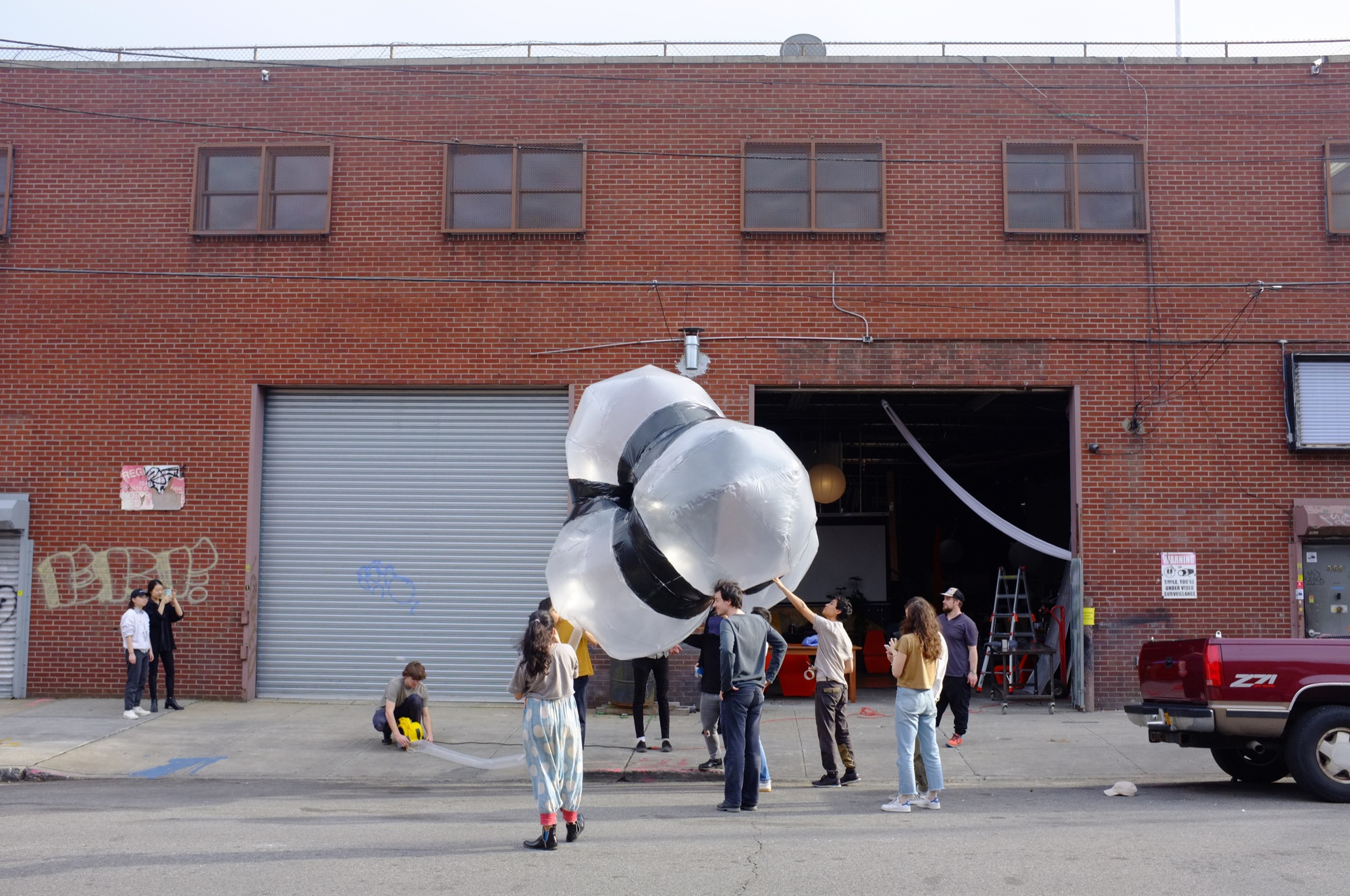
Photo from Air Sessions Workshop at Soft Surplus, taught by Austin Wade Smith and guest teacher August Lehrecke from Pneuhaus, with students from the Cooper Union School of Architecture
That’s a nice metaphor—in a cooperative, you are one plant contributing to the larger garden. Has it been hard to learn to operate this way yourself, and then teach other people how to operate this way? What has it been like to create these sorts of non-hierarchical spaces within a country that functions primarily through capitalist and patriarchal structures?
It’s interesting. Part of me is like, “Yeah, it takes some getting used to.” Everyone comes from different places. When we all gather together, we have, I don’t know, decades of a certain kind of hierarchy training embedded in us from school and jobs and whatnot. It is an interesting process in letting that go.
So yeah, there is an adjustment period. There are a lot of organizational structures and lived practices embedded in our bodies that we just enact by default. But through explicit facilitation practices or when we make meetings happen in a certain way, that helps change these conditioned ways of operating. In the process of learning to work this way, what really helps is, again, trust. Trust lets us give each other slack or be more accepting, and that really helps things be cooperative. But it is hard.
Would you call the cooperative frameworks you have for running these spaces a type of social software or technology?
Yes, I do think of them as technology, but in the same way that chairs are technology or a colander or a frying pan is technology. It’s open and sharable and usable and changeable, but without the implication of a highly deterministic sense of, “We’re locked into this track and if we do this, it will certainly produce this outcome.”
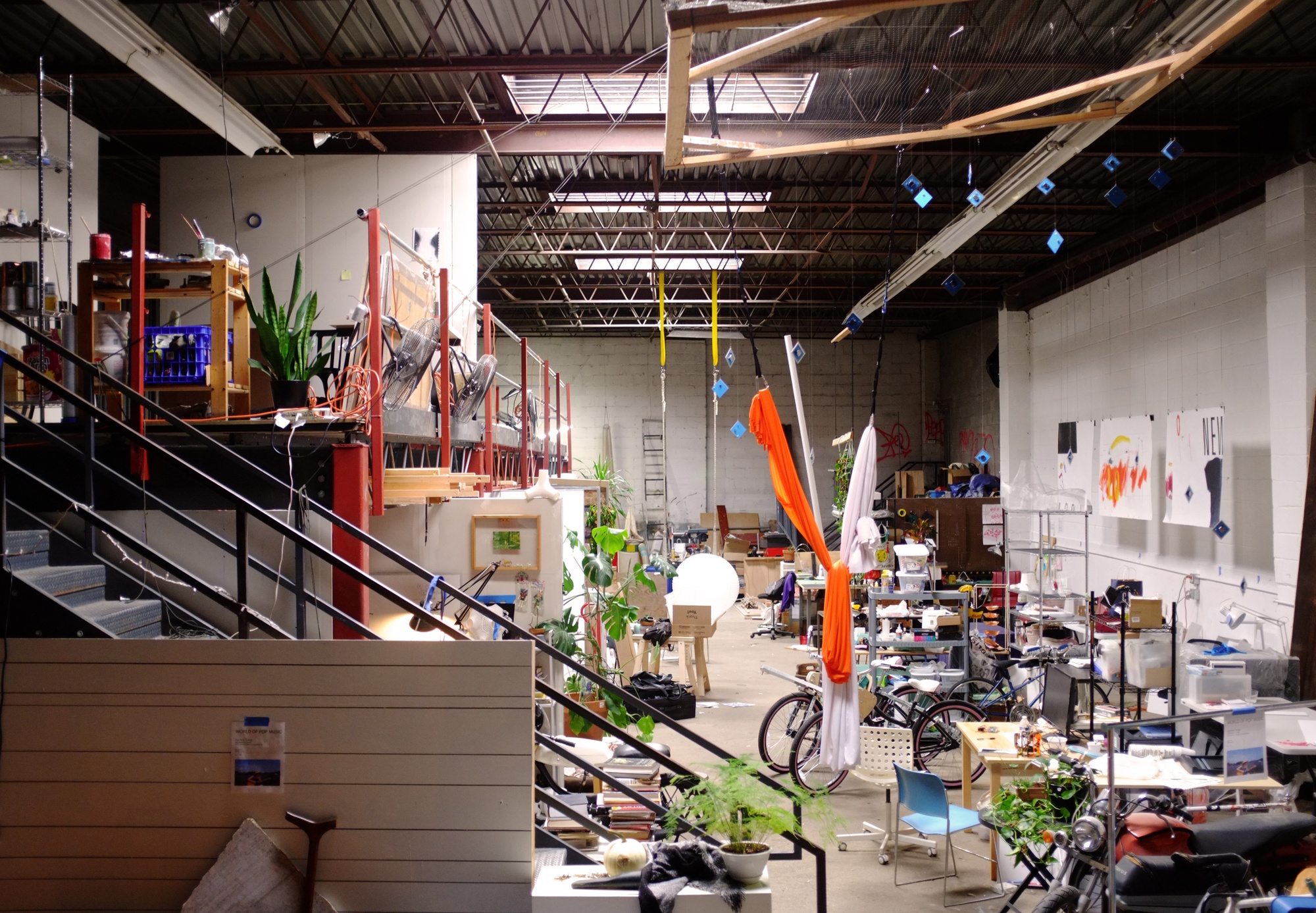
How do you keep a cooperative financially sustainable?
Well, with both of the spaces I’m part of, the main expense is rent. We pay our rent through member dues, mostly, and doing event rentals. We are pretty transparent about our finances. For Soft Surplus, I think a month ago, we did a budget meeting and we were like, “Here are our finances.” Our spreadsheets are on a Google Drive that all members can access.
We also have a work exchange system so that certain members have lower membership dues in exchange for doing work that they have defined as being helpful to the space. As part of this program, members have researched nonprofits, fiscal sponsorships, 501(c)3s, and talked to other people on our behalf. It creates an opportunity for them to do a hybrid kind of personal- and work-research project. They then presented what they found out, and shared a bunch of resources.
We’ve only tried this approach once, and now we’re starting to turn it into a system. I think a lot of things work this way, where the first time you try something, you just try it out without making a rule for it yet. Then the second time around, we’ll try to have a good process in place. If you make a process too early, you can overthink things and make it too rigid. So we were like, “Let’s try this thing out. Please tell us what you would like to work on for your work exchange.” Now we’re figuring out how to formalize this into a thing that all the members can apply to do, so that it’s a little bit more accessible.
The finances are both a hard part and the easy part of running a cooperative. It’s easy because it’s very transparent and we share our numbers. Also, in Soft Surplus’s case, Austin and Melanie and I, we initially put an investment into the space for the lease’s deposit and renovation, and things like that. Our goal at the end of five years is not to make any money, but just to get that money back.
That’s very generous.
Yeah, but also, we now have this amazing, socially beautifully space that we can make a lot of things in, and share with a lot of friends. We all have our own practices that we’re looking to be enriched through this cooperative, and so far, it has been amazing. The fact that we’re just looking to cover our costs after five years makes it very easy to be honest, if that makes sense.
Although, I do recognize that we have used a lot of our own labor in making it. I don’t know if I’d call it self-exploitation, but it’s in that territory, or maybe it used to be. Now it’s a little bit more healthy because the space is running on its own, kind of.
It’s tricky when you’re doing all this work because you want to do it, and it’s rewarding. But at the end of the day, you’re like, “How fast until I burn out?”
Yeah, totally. I think burnout needs more social acknowledgement. I had some friends run a retreat series upstate once every month. Burnout started to happen to the people running it, but I think they didn’t know it and we didn’t know it until it was too late to fix. They were so excited to host people and we did have this system of cleaning up and whatever, but yeah. I think social acknowledgement of burnout, before it gets out of hand and things stop being sustainable, is really important.
Back to your earlier answer about alternative currency, it’s almost like a currency of generosity or something. It needs to be reciprocated in some way, in order for it to be sustainable.
Yeah, it does. Most spaces we encounter are not spaces that are communal, as in a coffee shop, a coworking space, or an office space. They are spaces that run via capitalism and a whole network of hired hands, like janitors and everything.
Right, spaces that are more transactional.
Exactly. I feel like 99% of the spaces I enter into are transactional spaces, pretty much. Everyone has assumptions about spaces that are baked in from transactional experiences, so people would come to Prime Produce and Soft Surplus and be like, “Oh, who’s your janitorial staff?” It was a really interesting challenge to use different metaphors, like, “Think of this as your living room,” or, “Think of this as a commune.” Because most of the spaces we see are run in a specific way, and we don’t see a lot of alternatives to it, so people make a lot of assumptions.
If you were going to give somebody who is thinking of starting a cooperative space one piece of advice, what would it be?
Well first, definitely do it.
Beyond that, I think it’s trusting in the collective. If you make a cooperative, you have to know that you can’t design them; you can only grow them, like plants. If you grow one and you do it with other people, then everyone will undoubtedly have ideas about what the best way to grow it is. In my experience, there have been a lot of times where I’ve been like, “I think this is right,” and things haven’t gone my way. And in the end, that’s turned out okay.
When you trust in other people, really incredible and unexpected things can happen. Usually, it’s things where you’re like, “Oh, I didn’t even think of doing that,” or, “Oh, I don’t think that will work out well,” but it actually does. Part of trusting other people might involve letting go of certain images you have of what the outcome should look like. If you can do this, then things can flourish in a really healthy way—like a healthy garden with a lot of different plants growing around each other.
A postscript note from Dan on the cooperatives and collectives mentioned:
Melanie Hoff, Austin Wade Smith, and I started Soft Surplus together, and now there are many people who have grown and gardened it together: Amanda Lind, Andres Chang, Angeline Meitzler, Ann Haeyoung, beck haberstroh, Callil Capuozzo, Denny George, Édouard Urcades, Elizabeth Hénaff, Fei Liu, Jonathan González, Grace Jooyei Lee, Katie Giritlian, Lai Yi Ohlsen, Lily C. Wong, Lucy Siyao Liu, Nahee Kim, Pamela Liou, Phyllis Ma, Sandra Atakora, Taylor Zanke, and others. Prime Produce was initially founded as a non-profit by Jerone Hsu, and the physical space of the Prime Produce Apprentice Cooperative was initially created by Jerone Hsu, Chris Chavez, and myself. It is is now cooperatively organized by past and present members, residents, and fellows: Alex Qin, Amelia Foster, Chris Chavez, David Isaac Hecht, Emlyn Medalla, Home H.C. Nguyen, Jerone Hsu, Joe Rinehart, Larnell Vickers, Leng L. Lim, Marcos Salazar, Michelle Jackson, Patrick Paul Garlinger, Qiana Mickie, Qinza Najm, Rosalind Zavras, Sabrina Suliman, Saks Afridi, Wally Patawaran, Yasmine Fequiere, Yuko Kudo, Yvonne Chow, and so many friends, neighbors, and strangers.
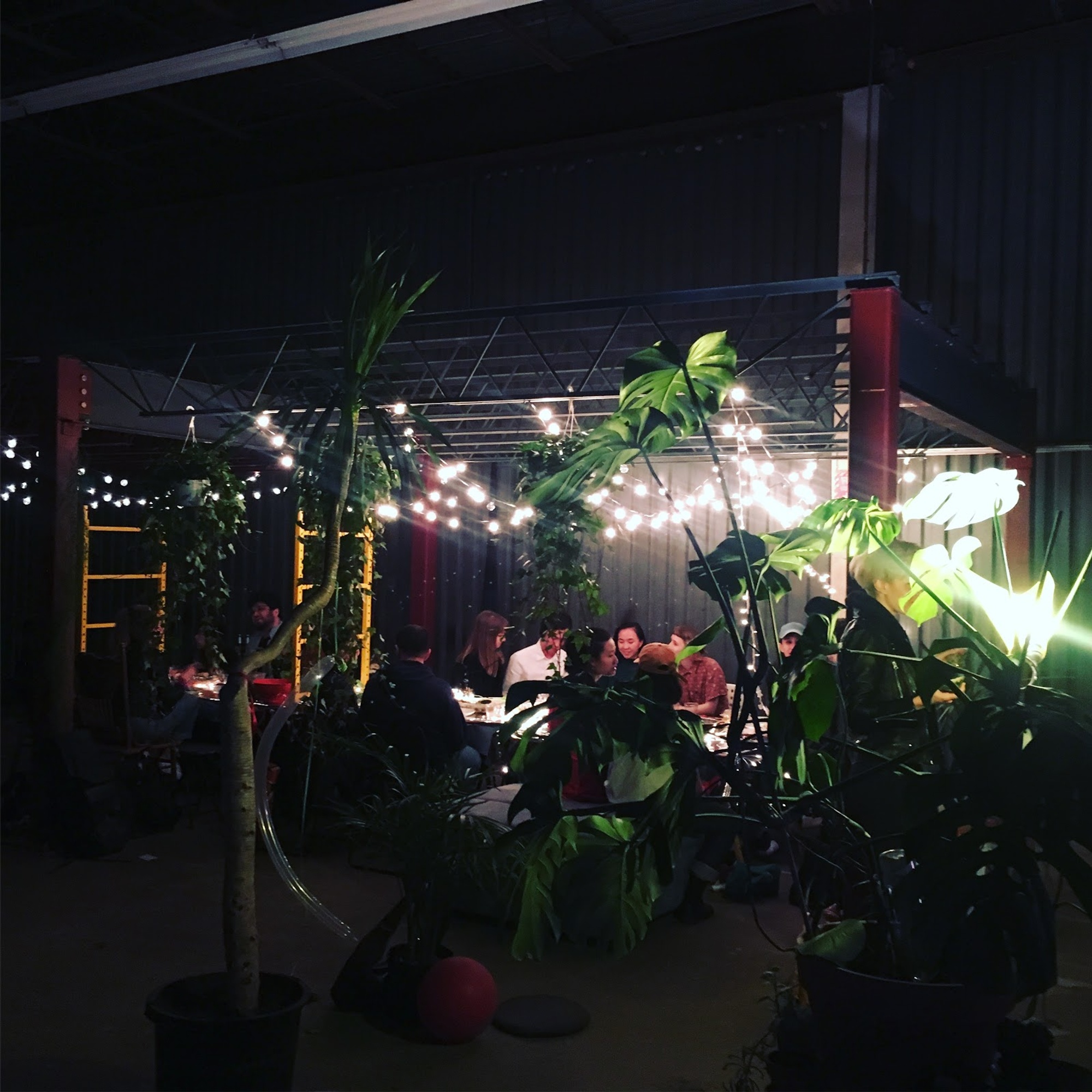
Dan Taeyoung Recommends:
-
Adrienne Marie Brown, Emergent Strategy & Pleasure Activism
-
Jo Freeman, The Tyranny of Structurelessness
-
Edwin Hutchins, Cognition in the Wild
-
Building a physical, material object without planning or designing it beforehand, and letting go of all expectations.
-
Trying some of the exercises in Augusto Boal’s Games for Actors and Non-Actors with a group of friends, acquaintances, or strangers.
- Name
- Dan Taeyoung
- Vocation
- Designer, Architect, Teacher, Learner
Some Things
Pagination
